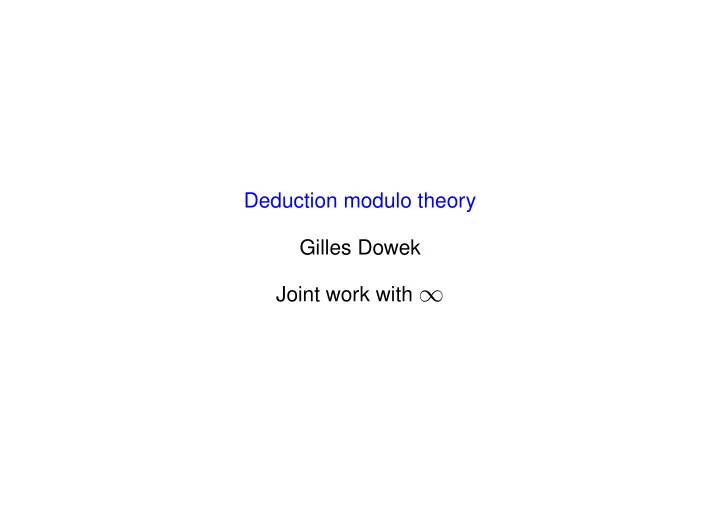

Deduction modulo theory Gilles Dowek Joint work with ∞
I. Comparing research projects in proof theory
Weaker vs. stronger systems Several directions at the same time Decomposing proofs, propositions, connectives, etc., into more atomic objects Weaker than Predicate logic: propositional logic, linear logic, deep inference, equational logic, explicit substitution, etc. Very little can be expressed in pure Predicate logic Stronger than Predicate logic: axiomatic theories, modal logics, types theories, Deduction modulo theory, etc.
Logical vs. theoretical systems Stronger than pure Predicate logic New logical constants, new rules: modal logics, simple type theory, etc. Function symbols and predicate symbols within Predicate logic, axioms: arithmetic, set theory, simple type theory, etc. Deduction modulo theory: theoretical rather than logical A framework in which it is possible to define many theories
Axioms vs. reduction rules A theory: a set of axioms reduction rules Axioms jeopardize: cut free proofs end with an introduction rule, witness property, search space of ⊥ empty, etc. 0 = 0 − → ⊤ S ( x ) = 0 − → ⊥ 0 = S ( y ) − → ⊥ S ( x ) = S ( y ) − → x = y Prove 4 = 4, Peano third and fourth axiom
Deduction vs. computation → ∗ ⊤ , then A provable if A − Not the converse Indeed, reducibility to ⊤ decidable, not provability On the opposite → ∗ ⊤ , proof of A just a computation (not a genuine If A − deduction)
The origins of Deduction modulo theory Automated theorem proving: equational unification (A, β ) Definitional equality in Martin-L¨ of’s type theory Prawitz’ Folding and unfolding rules
II. Problems and results: an overview
Expressing theories in Deduction modulo theories Specific theories: Simple type theory, Arithmetic, Set theory, ... General method for propositional logic, predicate logic: consistency implies cut elimination (classical case), but not optimal efficiency Partial methods for constructive logic (consistency not enough, what about consistency + witness?)
Automated theorem proving Resolution modulo theory: too complex: clauses rewrite to non-clausal propositions Polarized resolution modulo theory (and as a restriction of Resolution, SOS, SR) Ordered polarized resolution modulo theory (iProver modulo) Tableaux modulo theory: very good results for class theory (second-order logic, B-set theory) Super Zenon and Zenon modulo
Models Very close to Predicate logic: same models Validity of rewrite rules: A ≡ B implies � A � φ = � B � φ Extension to models valued in Boolean / Heyting algebras But: if ⊢ A ⇔ B , then � A � φ = � B � φ as well Too extensional, drop antisymmetry if ⊢ A ⇔ B , then � A � φ ≤ � B � φ and � A � φ ≥ � B � φ if A ≡ B , then � A � φ = � B � φ Many theories have a model in any pre-Heyting algebra
Cut elimination Depends on the theory: P − → P ⇒ Q no, P − → Q ⇒ P yes General criterion: a model valued in the (pre-Heyting) algebra of Reducibility candidates Only the construction of the model is specific
Dependent types Algorithmic interpretation of proofs (Curry-de Bruijn-Howard isomorphism): usually for specific theories ( λ Π -calculus, G¨ odel’s system T , Martin-L¨ of’s type theory, Girard’s system F , Calculus of (Inductive) Constructions, ...) λ Π -calculus + rewriting: all theories ( ∅ , Arithmetic, Simple type theory, Set theory, ...) Decouple algorithmic interpretation of proofs ( λ Π -calculus) from the choice of a theory (rewriting) Embedding Pure Type Systems in the λ Π -calculus modulo theory
III. Focus on Dedukti
An proof-checker for λ Π -modulo Just a proof-checker (no tactics, program extraction, user interface, ...) A suite of programs rather than a monolithic system Difficult to implement : compile reduction (lambda-calculus + arbitrary rewrite rules), but now an efficient implementation Download it and play with it
Why is it called Dedukti? λ Π -modulo theory: A logical framework (STT, PTS, etc.) Importing proofs from other systems Full library of HOL Coq, Focalize: under progress First-order proofs and proofs in Deduction modulo theory (iProver, Zenon, etc.): represent classical proofs PVS: future work Do your own
Future work: interoperability If A ⇒ B proved in T and A proved in T ′ prove B in T ∪ T ′ T ∪ T ′ consistent? Cut elimination? The HTML of proofs?
Future work: reverse mathematics A proof of 0 + x = x in a strong system (CIC, Z) What rules are actually used? What is the minimal theory where we can prove this? To which system can we export this proof?
Future work: tactics A formalization of the Cubical model of HoTT Would be great if we had rewrite rules at the level of tactics Can we design a better tactic language if rewriting is primitive?
Recommend
More recommend